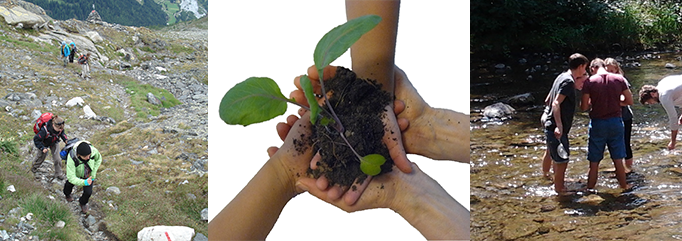Major: Earth and Environmental Sciences

Please note: The Major Earth and Environmental Sciences (EES) is now called Environmental and Sustainability Science (ESS). The name change in the context of the Stupo 2020, reflects the gradual content shift towards Sustainability Sciences in that Major that has taken place over the last years. The stronger emphasis on Sustainability Sciences provides more opportunities for interconnections with the other LAS Majors, and benefits from the interdisciplinary sustainability research focus at the University of Freiburg.
The Major Earth and Environmental Sciences provides a holistic view of our planet Earth. In the basic courses students study the physical and living environment in order to acquire fundamental knowledge of the nature surrounding us and to explore questions about the history and evolution of the Earth. Observed trends can then be used to better predict the future of the Earth, which is also influenced by human activity. The Major gives students a strong research-oriented foundation in the natural sciences and enables them to relate this to many 21st century challenges and possible solutions. The advanced modules provide specialization opportunities, with a strong emphasis on Environmental Governance and on Sustainable Resources and Energy.
The following chart gives you an overview of the modules in the Earth and Environmental Sciences Major:
The chart provides an overview of the Major composition, but the modules are not necessarily listed in the order in which they will be taken. You can find the full description of each module in the Module Handbook. The basic and advanced courses we offer in the above-mentioned modules are listed in the Course Catalog.
What do LAS students do with their EES Major after Graduation?
Full description
Students choose a Major after completing the Foundational Year. In the Major Earth and Environmental Sciences Major, students explore the human being and its interactions with the environment. In order to do so, they first acquire basic knowledge in the field of Earth and Environmental Sciences and then apply this knowledge and deepen their understanding in the Advanced Courses, Specialization Options, and Electives.
The Major includes a variety of interrelated disciplines with a strong focus on Environmental Governance and Sustainability as well as Natural Resources. Within the context of the LAS program, this approach provides the opportunity to participate in joint interdisciplinary courses and projects together with students from the other Majors.
The Major’s epistemological approach emphasizes the scientific method as the dominant form of knowledge acquisition in the sciences. The curriculum thus includes courses that familiarize students with observational and experimental methods and enable them to conduct a first research project in the sciences.
Graduates of the Liberal Arts and Sciences program who have completed a Major in Earth and Environmental Sciences finish the program with a bachelor thesis and are awarded the degree Bachelor of Science. This degree enables them to apply to a wide range of Master’s programs in various natural and some social science fields in Germany and abroad. Depending on their research interests and the subject-specific requirements of the Master’s programs that they are interested in, students are encouraged to choose courses in Advanced Modules and in the LAS Electives area that fit with their academic and career aspirations. Students are ultimately responsible for the choices they make, but they are supported and advised concerning their course selection by the course coordinator.
For more information about this Major, please contact Dr. Sabine Sané: sabine.sane@ucf.uni-freiburg.de
For a student perspective on the EES Major, please see the student-run EES website that covers experiences, courses and lecturers as well as internship and graduate program opportunities.


